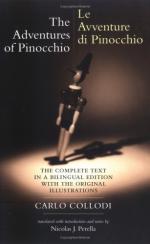“To look for a house or a hut, where they will be kind enough to give us a bite of bread and a bit of straw to sleep on.”
They had not taken a hundred steps when they saw two rough-looking individuals sitting on a stone begging for alms.
It was the Fox and the Cat, but one could hardly recognize them, they looked so miserable. The Cat, after pretending to be blind for so many years had really lost the sight of both eyes. And the Fox, old, thin, and almost hairless, had even lost his tail. That sly thief had fallen into deepest poverty, and one day he had been forced to sell his beautiful tail for a bite to eat.
“Oh, Pinocchio,” he cried in a tearful voice. “Give us some alms, we beg of you! We are old, tired, and sick.”
“Sick!” repeated the Cat.
“Addio, false friends!” answered the Marionette. “You cheated me once, but you will never catch me again.”
“Believe us! Today we are truly poor and starving.”
“Starving!” repeated the Cat.
“If you are poor; you deserve it! Remember the old proverb which says: ‘Stolen money never bears fruit.’ Addio, false friends.”
“Have mercy on us!”
“On us.”
“Addio, false friends. Remember the old proverb which says: ’Bad wheat always makes poor bread!’”
“Do not abandon us.”
“Abandon us,” repeated the Cat.
“Addio, false friends. Remember the old proverb: ’Whoever steals his neighbor’s shirt, usually dies without his own.’”
Waving good-by to them, Pinocchio and Geppetto calmly went on their way. After a few more steps, they saw, at the end of a long road near a clump of trees, a tiny cottage built of straw.
“Someone must live in that little hut,” said Pinocchio. “Let us see for ourselves.”
They went and knocked at the door.
“Who is it?” said a little voice from within.
“A poor father and a poorer son, without food and with no roof to cover them,” answered the Marionette.
“Turn the key and the door will open,” said the same little voice.
Pinocchio turned the key and the door opened. As soon as they went in, they looked here and there and everywhere but saw no one.
“Oh—ho, where is the owner of the hut?” cried Pinocchio, very much surprised.
“Here I am, up here!”
Father and son looked up to the ceiling, and there on a beam sat the Talking Cricket.
“Oh, my dear Cricket,” said Pinocchio, bowing politely.
“Oh, now you call me your dear Cricket, but do you remember when you threw your hammer at me to kill me?”
“You are right, dear Cricket. Throw a hammer at me now. I deserve it! But spare my poor old father.”
“I am going to spare both the father and the son. I have only wanted to remind you of the trick you long ago played upon me, to teach you that in this world of ours we must be kind and courteous to others, if we want to find kindness and courtesy in our own days of trouble.”




